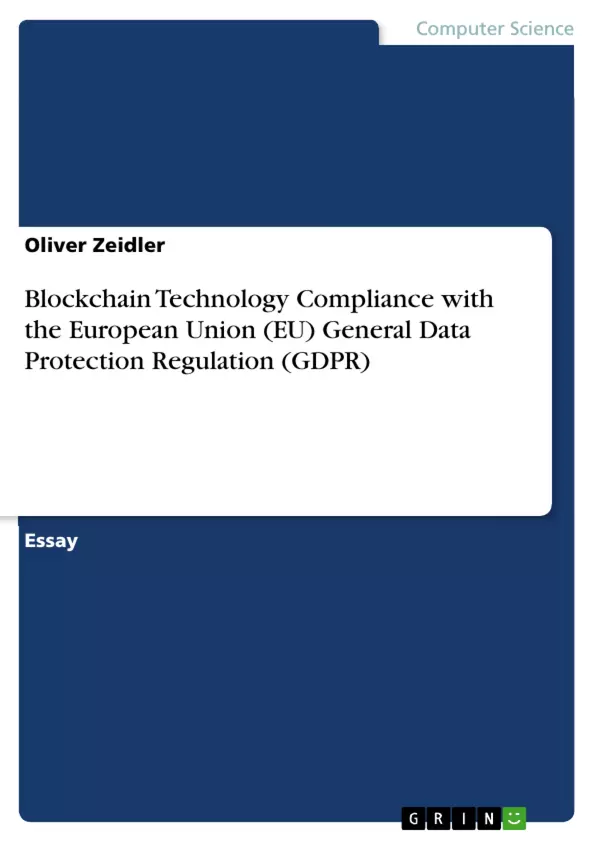In this essay, I will argue that the GDPR is slowing down technology progress in the EU with respect to the Blockchain technology. The blockchain is of particular interest to me as I detected the potential legal issues and impact of blockchain technology within my professional work.
I identified several legal ramifications in different fields of law, that I believe will raise major problems in the near future. Moreover, it is not currently certain how United Kingdom will treat the international law internally after Brexit, as Article 3 GDPR is limiting the spatial application area to the European Union and processes taking place in this terrain. I will outline these problems here.
Inhaltsverzeichnis (Table of Contents)
- Introduction
- Insight into Blockchain Technology
- Permissionless Blockchain
- Permissioned Blockchain
- Redactable Blockchain
- Blockchain Technology and the Processing of Personal Data
- Article 5 (1) a) GDPR: Transparency
- Article 5 (1) b) GDPR: Purpose limitation
- Article 5 (1) c) GDPR: Data minimization
- Article 5 (1) d) GDPR: Immutability of data
- Article 5 (1) e) GDPR: Storage limitation
- Conclusion
Zielsetzung und Themenschwerpunkte (Objectives and Key Themes)
This essay examines the compatibility of blockchain technology with the European Union's General Data Protection Regulation (GDPR). The author argues that the GDPR hinders technological advancement within the EU by restricting the use of blockchain for data processing and storage. The analysis focuses on the legal ramifications of blockchain technology within the context of the GDPR.
- Legal compliance of blockchain technology with the GDPR
- Impact of GDPR on technological progress in the EU
- Challenges of decentralized data processing under the GDPR
- Analysis of key GDPR principles in relation to blockchain
- Potential solutions and future directions for data protection in blockchain environments
Zusammenfassung der Kapitel (Chapter Summaries)
- Introduction: The essay introduces the topic and highlights the potential legal issues and impact of blockchain technology on various fields of law. It also addresses the implications of Brexit and the spatial application of the GDPR.
- Insight into Blockchain Technology: This section provides a comprehensive overview of blockchain technology, focusing on its key innovations, types, and functioning, including permissionless, permissioned, and redactable blockchains.
- Blockchain Technology and the Processing of Personal Data: This chapter delves into the legal compliance of blockchain technology with the GDPR, specifically analyzing Article 5 GDPR, which encompasses principles like transparency, purpose limitation, data minimization, immutability, and storage limitation. It explores the challenges and potential conflicts arising from the inherent characteristics of blockchain technology in relation to these GDPR principles.
Schlüsselwörter (Keywords)
Blockchain technology, GDPR, data protection, decentralization, transparency, purpose limitation, data minimization, immutability, storage limitation, redactable blockchain, legal compliance, technological progress, data processing, European Union, Brexit.
- Quote paper
- Oliver Zeidler (Author), 2020, Blockchain Technology Compliance with the European Union (EU) General Data Protection Regulation (GDPR), Munich, GRIN Verlag, https://www.hausarbeiten.de/document/922863


